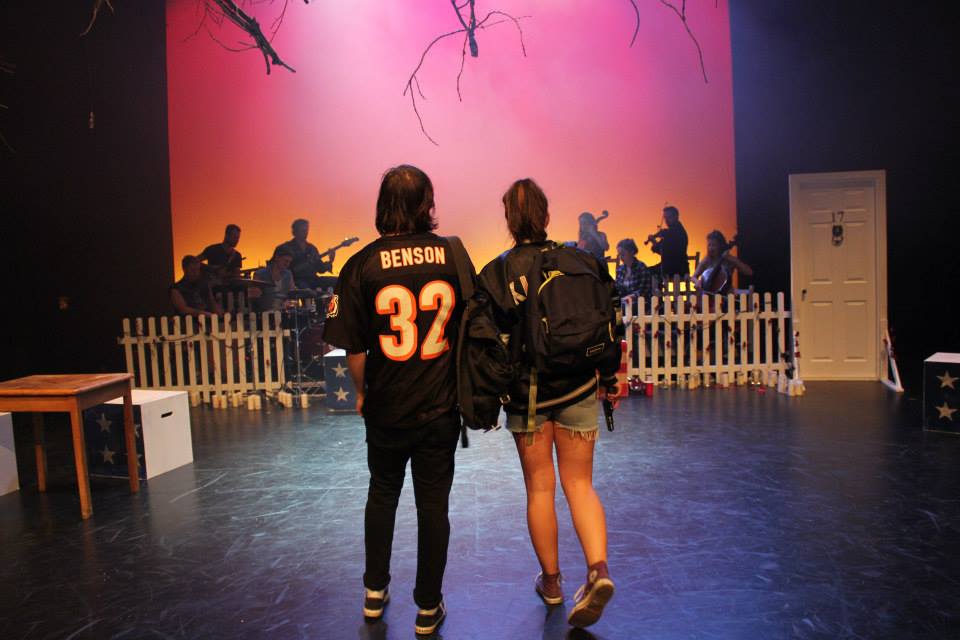Playwrighting 101: Why you should try writing for the stage.
Hey guys! I've been reading a lot of the writing posts and tips on here, so I thought I'd put together something to do with my own speciality: Theatre.
I'm a professional playwright, and have had work staged in venues across the UK and Scotland. I've dipped my paws into everything from Queer Fringe Caberet, to Theatre In Education, to Full Length Plays, to Book Writing for Musical Theatre (and yes, I've been paid to do all of this in various capacities.) All of the photographs attached to this post are of rehearsals or productions that I wrote for or worked on.
I was originally going to include suggestions for people who'd never written for the stage before, but wanted to give it a try. As the post was getting longer, I've decided to break it up into two parts. Today I'll talk about why you should, and tomorrow I'll talk about you can.

Taking the Plunge
For a lot of prose writers and poets, writing for theatre can seem like a daunting and unfamiliar world. The structure of plays means that the quality and rhythm of their writing can be lost on the page, and sometimes even the most chillingly powerful dialogue can seem hokey or twee without the pulse of live performance that it was written for behind it.
There can also be a sense of helplessness when you first start writing for the stage, because (unless you've written a one man show which you plan to star in yourself) you must eventually hand over your script to someone else in order for it to live and breathe. As if the challenge of finding actors and directors wasn't difficult enough, you need to find ones who you can trust not to completely mangle your precious baby!
To add insult to injury, once you've overcome the already gargantuan hurdles of writing the thing, casting the thing, and staging the thing, if the audience don't like your work, they aren't off getting bored in private, they're doing it right there in front of you and your cast. They're yawning, fidgeting, laughing through the serious bits and silent for the jokes. They sneak out in the interval or they heckle during the finale.
Wouldn't it be easier to just stick to prose, so they can go back to hating your novel in private? Considering all of this, you must be wondering...
Why Write For Theatre At All?

The most simple and honest answer I can give you is this:
Yes, it's very different from prose writing, where you are the god of your own small world. When writing for stage, you're more like a general frantically trying to persuade your troops to all go the same way, but by sacrificing that absolute control, what you gain is the thrill of seeing other people take your work and breathe a new and unique life into it.
You might have to watch people getting bored in the audience, but you also get to hear them laugh, and gasp, and react in all the right places. I remember acutely, at the end of my last show, looking down into the audience as the show reached it's climax, and seeing the stage lights reflecting off the tears on people's faces. Watching the ushers at the back of the auditorium wiping their eyes. When the final curtain fell I remember watching over a thousand people rise to give the piece a standing ovation, and the feeling of being so confronted by the raw emotion your work has provoked is like nothing else.
And even more than it is personally fulfilling, you have to remember...
Theatre Is Powerful
Don't get me wrong, at it's worst, theatre is elitist, exclusionary, and extremely boring, but at it's best? It can be literally anything.
It can be fifty people on a huge stage doing cartwheels, or it can be one person in the room above a pub setting the world to rights. Fringe theatre especially has the potential to be an agile, daring, and democratic art form. Your ideas don't have to be polite, your writing doesn't have to be polished to perfection, you can make it as quick and dirty as you like, and you can keep editing it until the moment the players hit the stage.
You can make theatre on a shoestring, often with actors who'll contribute their work out of a love of their craft, or a love of your script. There are few gatekeepers to putting on your own work, and it's often the best way of making a noise that your local regional theatre will hear, if you have ambitions of purusuing theatre as a career.
This also means that you can make work which takes risks, work which is timeless, or work which is political and responsive to a changing world. Theatre has a freedom which no other art form enjoys. It never feels quite as set in stone as film or prose does.
Hopefully by this point I've managed to get you hyped up enough about my favorite artform that you want to give it a try, but if the prospect of writing a 90 minute play from scratch is a little daunting, tomorrow I'll be posting a few ideas for setting off into the brave new world of writing for theatre!
thanks for searing.
I like this idea very much. Do you think it would be worth approaching local theatre groups with finished plays?
Congratulations @conwaaaaaaay! You received a personal award!
Click here to view your Board
Congratulations @conwaaaaaaay! You received a personal award!
You can view your badges on your Steem Board and compare to others on the Steem Ranking
Vote for @Steemitboard as a witness to get one more award and increased upvotes!